 MyDogBreeds
MyDogBreeds Norwegian Lundehund is originated from Norway but Istarski Ostrodlaki Gonic is originated from Croatia. Norwegian Lundehund may grow 20 cm / 7 inches shorter than Istarski Ostrodlaki Gonic. Norwegian Lundehund may weigh 18 kg / 39 pounds lesser than Istarski Ostrodlaki Gonic. Both Norwegian Lundehund and Istarski Ostrodlaki Gonic has almost same life span. Norwegian Lundehund may have less litter size than Istarski Ostrodlaki Gonic. Norwegian Lundehund requires Moderate maintenance. But Istarski Ostrodlaki Gonic requires Low maintenance
Norwegian Lundehund is originated from Norway but Istarski Ostrodlaki Gonic is originated from Croatia. Norwegian Lundehund may grow 20 cm / 7 inches shorter than Istarski Ostrodlaki Gonic. Norwegian Lundehund may weigh 18 kg / 39 pounds lesser than Istarski Ostrodlaki Gonic. Both Norwegian Lundehund and Istarski Ostrodlaki Gonic has almost same life span. Norwegian Lundehund may have less litter size than Istarski Ostrodlaki Gonic. Norwegian Lundehund requires Moderate maintenance. But Istarski Ostrodlaki Gonic requires Low maintenance
 The Norwegian Lundehund hails from the island of Vaeroy, Norway and was created for the purpose of puffin hunting.
The Norwegian Lundehund hails from the island of Vaeroy, Norway and was created for the purpose of puffin hunting.
Now that these puffins are a protected species, the dog is no longer used for hunting and has become a companion dog.
The breed decreased in numbers during- and after World War II because the islands where he came from had an outbreak of distemper. It was in 1963 that another outbreak occurred and the dogs were almost wiped out. A breeding program saw their numbers being built up.
It was in 2011 that the dog was recognized by the American Kennel Club.
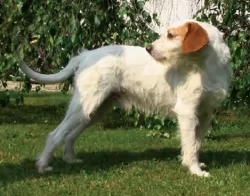 The Istarski Ostrodlaki Gonic, also referred to as the Istrian wire-haired or short-haired scenthound is a very ancient dog breed. Apparently the dog has been found in paintings that go way back to the early 1700s.
The Istarski Ostrodlaki Gonic, also referred to as the Istrian wire-haired or short-haired scenthound is a very ancient dog breed. Apparently the dog has been found in paintings that go way back to the early 1700s.
The dog can either have a short, smooth coat or a rough, wiry longer coat. He has always been popular with hunters, used for hunting rabbits and fox.
An interesting fact with this dog is the correlation between the Dalmatian dog and the Istrian short-haired hound. According to veterinary investigations, there are strong likenesses between the two breeds.
The truth is, the origin of the Istrian has been a matter of dispute for some time but in 2003 the Federation Cynologique Internationale recognized the breed as hailing from Croatia.
 As a spitz-type dog, with the Lundehund you’ll recognize the typical spitz-dog characteristics – the erect ears and the tail that curves over the back.
As a spitz-type dog, with the Lundehund you’ll recognize the typical spitz-dog characteristics – the erect ears and the tail that curves over the back.
He is a small to medium sized dog standing at 30 – 40cm and weighing 6 – 9kg. He is an active dog and is as agile as a fox.
He has a dense double coat which is white, reddish/tan with some black tips. He is a dog which sheds constantly.
Strangely this dog has 6 toes and his rear pads have elongated foot pads which have helped the dog be able to climb over rocks. He also has a flexible type of neck that is capable of craning back so that the head touches the spine. The dog has some unique features and wriggling in and out of small spaces is another of his characteristics. In fact he can do things that you would not imagine a dog could do.
When you have a Lundehund in your life you’ll agree he has a happy, amicable personality. He is non-aggressive.
He will require training and socialization as he is an independent dog who can be obstinate. He is quite aloof with strangers too and once he starts barking at them he tends to want to continue. Training him will put an end to that irritating behavior. He is a loving, loyal dog, enjoying the company of his human family.
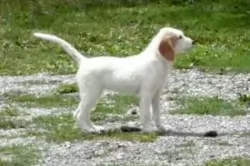 Medium in size, the Istarski Ostrodlaki Gonic stands at roughly 43 to 60cm at the withers and weighs roughly 12 to 27kg. The chest of the dog is broad and deep, the skull slightly rounded while the muzzle is strong and rectangular shaped. The nose is dark brown or black.
Medium in size, the Istarski Ostrodlaki Gonic stands at roughly 43 to 60cm at the withers and weighs roughly 12 to 27kg. The chest of the dog is broad and deep, the skull slightly rounded while the muzzle is strong and rectangular shaped. The nose is dark brown or black.
The ears are floppy and are nearly always in the orange color while the tail is long and is carried low. The coat of the rough haired dog is of medium length. In fact the coat can either be short and smooth or longish and wiry with a woolly undercoat. The color of the coat is white with orange markings.
This breed of dog is sought after for his cheerful personality. He is loyal to his human family and is a social dog, loving to spend time around his family.
He is energetic, confident and strong-willed and this is why, as with most other dogs, he will benefit from training and socialization, as this makes him obedient and responsive to his owner. He is evenly tempered, being gentle and docile.
 The Norwegian Lundehund isn’t your everyday dog and in fact he is known as a primitive breed. Perhaps he wouldn’t be the best dog to have if you’re a first-time dog owners as training is quite difficult too.
The Norwegian Lundehund isn’t your everyday dog and in fact he is known as a primitive breed. Perhaps he wouldn’t be the best dog to have if you’re a first-time dog owners as training is quite difficult too.
People who are willing to take a chance on him say that with training and socialization he can become a loving canine companion.
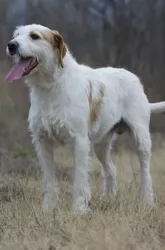 The Istrian Wire-haired Scenthound or Istarski Ostrodlaki Gonic as he is also referred to is a strong, well built hound which is elegant in appearance.
The Istrian Wire-haired Scenthound or Istarski Ostrodlaki Gonic as he is also referred to is a strong, well built hound which is elegant in appearance.
He has a remarkably striking coat - bright white with orange markings. He has always been an excellent hunting dog, even to this day. This background hunting of his will require that he receives ongoing exercise as well as mental stimulation.
Treat this beautiful dog well - exercise him, groom him, feed him well and love him and you will be rewarded with the loyal and devoted friendship of an amazing dog.
 The Lundehund is prone to digestive disorders but even so he has got a good chance of living to be 11, 12, 13 or 14 years of age with good care.
The Lundehund is prone to digestive disorders but even so he has got a good chance of living to be 11, 12, 13 or 14 years of age with good care.
He is however, one of these dogs prone to health problems of which chronic intestinal disease is one. Its the kind of illness that can recur because it is resistant to treatment.
Experts on these dogs say that they should have a fecal test done every 6 months or so, saying that one thing a bit negative with this dog breed is that you may well be forking out quite a bit on chronic veterinary care.
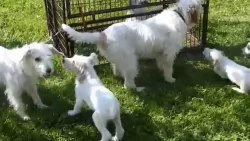 There are people who don’t take dental disease seriously in dogs as they think that it simply affects the teeth, when in fact dental disease can affect the dog’s entire body.
There are people who don’t take dental disease seriously in dogs as they think that it simply affects the teeth, when in fact dental disease can affect the dog’s entire body.
Dental- and gum disease is to be regarded with concern as it can be painful and even life threatening. It affects many dogs, and unfortunately your Istarski is also likely to have problems with his teeth. Tartar build-up and infection of the gums can lead to tooth loss but also damage to the kidneys, heart and joints.
Dogs need to have their teeth attended to regularly and if this is something new to you, speak to your vet and find out about special canine toothpaste and toothbrush and how to use them.
Dogs can be susceptible to bacterial and viral infections such as rabies, distemper and parvo, and that is why visits to your vet are so important. These life-threatening diseases for your Istarski Ostrodlaki Gonic are preventable through vaccinations.
 Like any other dog, the Norwegian Lundehund will do well on the best quality food. If you buy him commercially manufactured food, check the ingredients on the packaging. Lots of these lower quality foods are made from ingredients that are toxic for your pet, so buy a good quality one.
Like any other dog, the Norwegian Lundehund will do well on the best quality food. If you buy him commercially manufactured food, check the ingredients on the packaging. Lots of these lower quality foods are made from ingredients that are toxic for your pet, so buy a good quality one.
Buy food according to your dog’s age and activity levels. To make his meals more interesting, add in some delicious home prepared food for him. Stay away from spicy, exotic foods and go for something like boiled chicken, brown rice and vegetables. Some raw meat added to the kibble from time to time can also do wonders for your pet as he requires a high-protein diet. Make sure he always has access to fresh, cool water.
Other ‘caring’ things to do to make sure your pet has a quality lifestyle is -
Brush his hair twice a week as he is a fairly heavy shedder. Not only does it keep the coat nice and shiny, it builds up a bond between you and your pet.
Check his ears and eyes regularly to make sure they are free from infection.
Clip his nails when they get long as your pet can hurt himself if the nails hook onto things.
Whenever he is ill, get him to the vet for a check-up.
Make sure he has a nice safe, dry, warm, snug place to sleep.
Keep him well exercised. A dog that is put into the backyard and more or less forgotten will be most miserable. Why get a pet if you don’t want to make him a 100% part of the family?
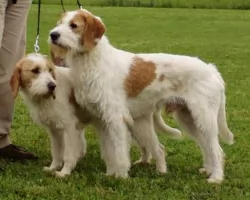 Taking care of an Istarski Ostrodlaki Gonic dog is much like caring for a child – doing everything you can to keep him healthy and happy, after all, he is a member of your family.
Taking care of an Istarski Ostrodlaki Gonic dog is much like caring for a child – doing everything you can to keep him healthy and happy, after all, he is a member of your family.
You want to be watching his diet and making sure that it is the best quality there is, full of vitamins and minerals to keep his eyes bright, his nose wet and his tail wagging.
There are excellent commercially manufactured dog foods on the market today and the best ones ensure excellent nutrition for your dog to keep him in optimal condition through each stage that he goes through. Try to include some home-made food into this kibble such as cooked chicken, brown rice and vegetables and it can be to his benefit to just to include some raw meat from time to time.
Make sure your Istarski Ostrodlaki Gonic is well exercised, that you check his teeth and ears to ensure there are no infections and to call the vet immediately you suspect something is wrong. Make sure you have him examined as a puppy and that he gets his necessary injections as there are diseases that can kill your dog.